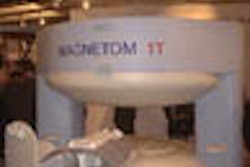Despite studies warning of the potential dangers of tungsten mechanical detachable coil implants, the devices are apparently still available for the treatment of intracranial aneurysms in vascular malformations.
In this month's issue of Radiology, Dr. David Pelz cited previously published studies on the long-term effects of implanted tungsten coils, including lung fibrosis, dermatitis and possible renal failure. Pelz is in the department of diagnostic radiology and clinical neurological sciences at the University of Western Ontario in Canada (Radiology, February 2000, Vol. 214:2, pp.602-603).
Pelz said he wrote his letter to Radiology in early 1999 to draw the general imaging community's attention to the issue, particularly because the two main studies on the issue appeared in journals specific to interventional neuroradiology.
The first study was conducted by researchers in France, who published preliminary results on the treatment of intracranial aneuryms in 1997. Researchers looked at 57 patients with 60 aneurysms who were treated between January 1994 and June 1995. The authors concluded that "mechanical detachable coils provided good angiographic and clinical results" and were a low-cost device, but required long-term follow-up.
Patients were evaluated after three months, 15 months and three years. In five cases where tungsten mechanical detachable coils were used, the researchers found a decreased level of radiopacity or a possible resorption of the coils (Intervent Neuradiol 1998, Vol.4, pp.337-340).
An experimental study involving animals found that the coils showed discoloration three to six months after deployment. Electron microscopy found tungsten in several areas, including the adventitia of the aneurysms (Intervent Neuroradiol 1998, Vol.4, pp.341-342).
How extensive the use of tungsten mechanical detachable coils is in Europe is unclear. In a response to Pelz's letter, the French authors said they informed French medical authorities of the problem, but "unfortunately, we are not responsible for prohibiting any kind of therapeutic devices."
Balt Extrusion of Montmorency, France still markets tungsten coils, according to their Web site, www.balt.fr, but the company also has begun producing platinum coils. Balt officials did not respond to a request for comment.
Other platinum coils, specifically the Guglielmi detachable coil by Boston Scientific of Natick, MA, are currently used in North America and Europe.
By Shalmali Pal
AuntMinnie.com staff writer
February 24, 2000
Click here to let AuntMinnie.com know what you think about this story.
Copyright © 2000 AuntMinnie.com



















